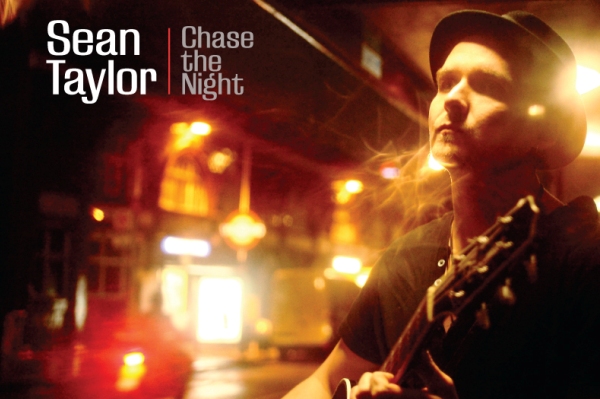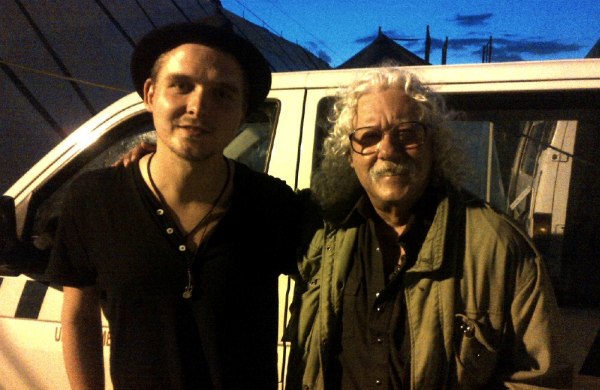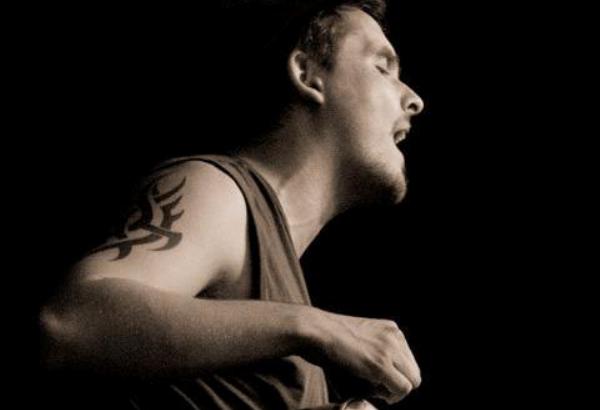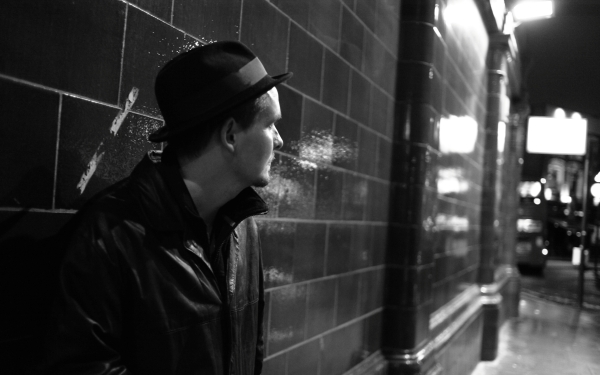THE barman of the Black Lion points up the Kilburn High Road. “’E looks like a musician,” says the neatly dressed man in a black uniform.
Sure enough, Sean Taylor is peering in through the pub’s window. He’s also in black: dark raggedy boots, black jeans, and a dusky jacket, topped off with a grey trilby.
The barman’s right. Sean looks every bit the genre-cutting troubadour I’d expected.
The bar’s not open. It’s midday on a plain Monday. So we pop over to the café in the Tricycle — another of Kilburn’s iconic venues.
The setting is apt. Sean has just released Chase The Night, his sixth studio album where he picks up place-centred themes hinted at in last year’s record Love Against Death.
For example the song Kilburn, a homage to this history-steeped, artistic, Irish area of London.
Sat on a comfy sofa, I ask how growing up around here influenced his music.
“Massively,” affirms Sean, taking a sip of his cappuccino. “What I love about London, and Kilburn is an extreme example, is that you can take a road and freeze it and there are about 70 or 80 nationalities there.
 Sean went to Congress House Studios in Austin, Texas to record his new album
Sean went to Congress House Studios in Austin, Texas to record his new album“My mum’s family are all immigrants,” who hail from Navan, Co. Meath, he explains.
“I just think it’s the best thing about London. It’s sad when you see stuff on the news about these terrible UKIP [politicians] and all that because I love different cultures. Southall or Kilburn or Willesden – they are like other countries.”
He recalls his schooldays nearby in Cricklewood.
“By the age of 12 I could swear in all these different languages,” he jokes.
Kilburn’s influence can be heard on new tracks like Biddy Mulligans — a remarkably touching and tender song about the now closed Irish pub.
“Biddy Mulligans is all about Kilburn,” Sean agrees. “It’s a betting shop now,” he shrugs with disappointment. “That’s austerity for you, it hurts.”
He adds: “Kilburn’s changed a lot. It’s not as Irish as it once was.
“A few years ago it looked like it was going to become gentrified,” Sean pauses to consider, before laughing: “That’s not really happened."
The song Biddy Mulligans is “a symbol” of changes that have taken place growing up.
“It’s like a lot of Irish pubs and a lot of Irish areas,” he says, before quoting the song's lyric:
‘At Mass on a Sunday morning, The purest of green fills all our dreams, Smell of turf and taste of Guinness here.’
"It's a song about people being away from home, but staying together at the same time.
“I think it's very sad when you walk down Kilburn High Road and you see these old Irish guys who’ve found their seat in the pub, and that’s it… until the end…
“There’s something sad about that, but at the same time something comforting.
“You know - that it is their seat and it is their home.”
It’s their world.
“Yeah, it is,” Sean agrees.
Have you tried to give a voice to those forgotten people?
“Um, yeah. I love outsiders; I’m an outsider. I’m not part of anything really in terms of, I always see myself as not part of a group or”
Even a set musical genre, I interrupt.
“Yeah, I’m not and a good example is Van Morrisson – I mean, what genre is he?”
Sean tells me his mother worked at the London Irish Women’s Centre — also now shut. Have some things about the community remained?
“Yeah, my mum still goes to the Kilburn Mass, and it could be Ireland there. You get the old guys who wait at the back and don’t go in, and all these strange little things,” he says.
“Then after you go for a pint of Guinness in the pub.”
Other tracks on Chase The Night feature Sean’s trademark rich yet smoky-toned voice and blues-infused riffs beyond most guitar players of 29.
While these are familiar, there’s a noticeable look inward to the capital he’s lived in all his life particularly through tracks like River and London (the latter features double bass legend Danny Thompson).
Why London now, I wonder.
Sean says a trip back to America where he recorded his last two albums was also a factor.
He once again teamed up with Mark Hallman (who’s worked with Carole King and Ani DiFranco) in Austin, Texas.
“I felt very homesick,” Sean explains. “And quite alienated, and so I thought a lot about home the two times I went.
 Sean played with Woody Guthrie's son Illa on tour. He was “such a nice guy”.
Sean played with Woody Guthrie's son Illa on tour. He was “such a nice guy”.“I think idea of having a place as a centre was really important in my album [too],” he continues.
“The idea of [having] something you come back to. Something everything revolves around.
“I love the idea of using place as a starting point and an end.”
The result from that trip to Austin was an upbeat, affirming and by turns exhilarating record that shifts and flows like the Thames immortalised in River, a song awash with literary allusions including John Milton and other artists who have paid homage to the city.
“I love the buzz of the city,” Sean says. “Every city. Whether it’s Paris or Dublin or London. There’s a kind of danger to it. There’s an excitement at night when you don’t know what’s going to happen next.”
“In London, you can walk down any road and there’s stories everywhere. It’s an exciting place to be.”
Is there anything that makes you fed-up with London? “No.” he laughs once more.
“I think,” Sean leans back – pausing almost apologetically before saying: “I love it. It’s like all things you love though,” he concedes. “There’s always stuff that makes you think ‘I’m sick of that’.
“I remember trying to record at home where I live and in every song I’d have police sirens on the track and it worked for the more bluesy ones, but if you’re trying to record a love song and it takes the song into a different avenue.
“Sometimes the noise is tough and it’s hard to escape the buzz of London, but that’s the love of it as well.”
Sean takes another sip of his drink.
“I think the riots were a big thing for me a few years ago,” he says. In what way?
“We [Londoners] got a very bad name for that.
“Then the Olympics, when everyone was looking at London in a specific way,” he adds.
But you didn’t think that was good?
“I thought some of it was good; but some was not so good.”
 Sean plays The Half Moon in Putney, London on October 23, where he will join up with the legendary double-bass player Danny Thompson
Sean plays The Half Moon in Putney, London on October 23, where he will join up with the legendary double-bass player Danny ThompsonWhat didn’t you like?
“The corporate stuff. The fact that it was a glossy version of London because it was very much the elite who enjoyed it really,” says Sean.
“And that area of Stratford… I remember it years ago, it was really rough.
“Lots of local businesses struggled and communities were moved about,” adds Sean, who clearly has a cabbie-like knowledge of the city.
Returning to the album, Sean says the song River took him five years to pen. However, London came together after a late-night session with Hallman on Bulleit Bourbon whisky in Austin.
“The words were written before that, though,” admits Sean.
“When artists start sharing ideas and melodies, that’s what co-writing is for me,” he says reflectively. “And yeah, we drank a lot of whisky too.”
Our own, non-alcoholic drinks consumed, I ask what plans he has for the future.
“Keep writing, keep gigging, keep playing,” he says simply. I ask how he feels about hitting the big three-oh this year.
“Ah, it’s depressing,” Sean says with a broad smile.
“It’s weird though, because a lot of the gigs I do [which have included shows alongside Glen Hansard, Lisa Hannigan and Arlo Guthrie] I’m the youngest.
“They’re all about 60, 70 and they’ve had about 20 wives.
“Thankfully there’s no age restriction [in folk and blues music]. I’d be burnt out if I was on Pop Idol. I’d be looking do to a Big Brother series soon, I’d be finished.”
After the interview, Sean generously offers to take me for a stroll down the High Road back to the station.
 Kilburn played a big part in Chase The Night, Sean Taylor's sixth studio album
Kilburn played a big part in Chase The Night, Sean Taylor's sixth studio albumTopics covered so far in our wide-ranging chat have included Glastonury (where Sean has both played and visited numerous times); UKIP and socialism; London’s regeneration; the modern music business; Liverpool FC; the history of Camden's music scene; and acts we remember from the London Flead (Mary Cockler and Paul Brady, Shane MacGowan, Kirsty McColl – and of course, one of the original troubadours, Bob Dylan).
And then I’m treated to a walking tour of the old haunts and live music venues of Kilburn. Sean takes me past pubs – many of which have changed hands and names – while recounting stories, including one where someone shot themselves in the toilet. And tales of former gig hot-spots, like the National, where Van Morrison and Nirvana once graced the stage.
At Kilburn Park station, he takes his leave along Cambridge Avenue. Past quotes by renowned locals, from Zadie Smith to Bradley Wiggins, are imprinted on a wall next to where a future housing development is being built.
Perhaps this is a sign of regeneration finally reaching Kilburn for real. As Sean turns and disappears up the hill, I can't help but think that it might be only through the likes of Sean Taylor that some of the stories of this fascinating area of London will go on being told.
Sean Taylor’s album Chase The Night is out now.
Sean plays Crispin Inn, Sandwich (October 11); Royal Spa Centre & Town Hall, Leamington Spa (October 12); Liverpool Irish Festival, Liverpool (October 19); The Half Moon, Richmond, London (October 23); Maltings, Farnham (October 25); Cluny 2, Newcastle (November 2); Little Rabbit Barn, Colchester (November 23).

